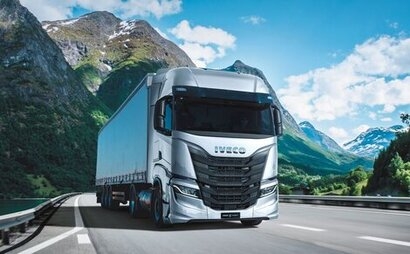
The two companies want to promote the use of biomethane in heavy-duty transport as a fuel alternative that emits significantly less emissions and is already available today. Bio-LNG can reduce CO2e emissions by approximately 86 percent compared to diesel and thus contribute to reaching the EU’s 2030 climate targets. Shell is scaling up the Bio-LNG supply chain while offering customers progressive emissions reductions.
“Working across the sector with customers and partners is the only way we will be able to change heavy duty transport sustainably” said Thomas de Boer, Vice President at Shell Commercial Road Transport. “The collaboration with Evonik has presented the opportunity for us to jointly help drive the defossilization of transport within the chemical sector, delivering a positive step toward the sector’s climate targets in a commercially viable way with Bio-LNG. That is very promising and good news to the sector.”
The joint action by Evonik and Shell is part of an initiative that the specialty chemicals company launched in January. The aim is to lower the group’s indirect CO2e emissions from the transportation of raw materials and finished products. This is to be achieved through increased cooperation with selected logistics partners that use trucks running on with Bio-LNG. Currently, 10 percent of Evonik's truck transports for packed goods in Europe are shipped in climate-friendly trucks. The specialty chemicals company has set for itself the goal of increasing this share of packed goods in Germany to 20 percent by 2025.
“With our initiative, we show that sustainable mobility with Shell Bio-LNG is already possible today” added Volker Wehber, head of Evonik's global SEPURAN Green business for biogas membranes. “Our innovative membrane technology for efficient upgrading of biogas makes it possible to use liquefied or compressed biomethane as an alternative fuel.”
Shell offers a blend of Bio-LNG to its entire branded LNG refuelling network in the Netherlands, offering around a 30 percent reduction of carbon emissions to all customers. Furthermore, the company plans to offer a blend of Bio-LNG to its entire branded LNG network in Germany by the third quarter of 2023. To support the effort, Shell is currently building a new biogas liquefaction plant at its Energy and Chemical Park Rhineland. The plant’s 100,000-tonne annual Bio-LNG volume could help to reduce the commercial transport’s carbon emissions, aiming for carbon neutrality for the entire German network.
Iveco is currently covering the entire commercial vehicle range from light vans and medium-duty trucks to heavy-duty semitrailer tractors for long-distance freight transport with robust gas-powered vehicles suitable for Bio-LNG and/ or Bio-CNG. The gas engine technology is the result of decades of intensive research and development work, which is already paying off towards climate friendly heavy-duty mobility today.
For additional information:

